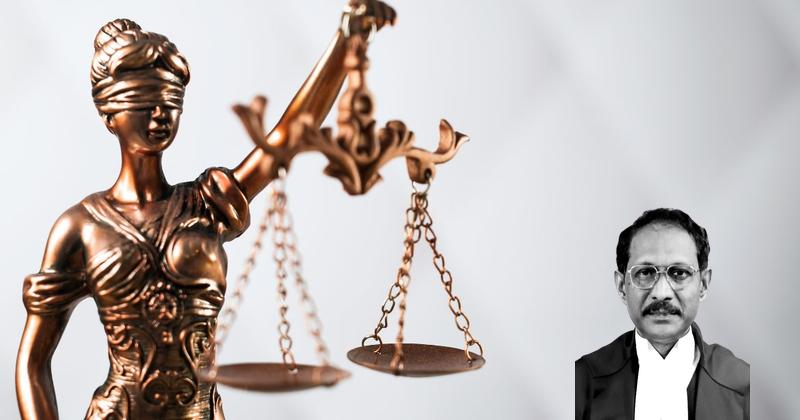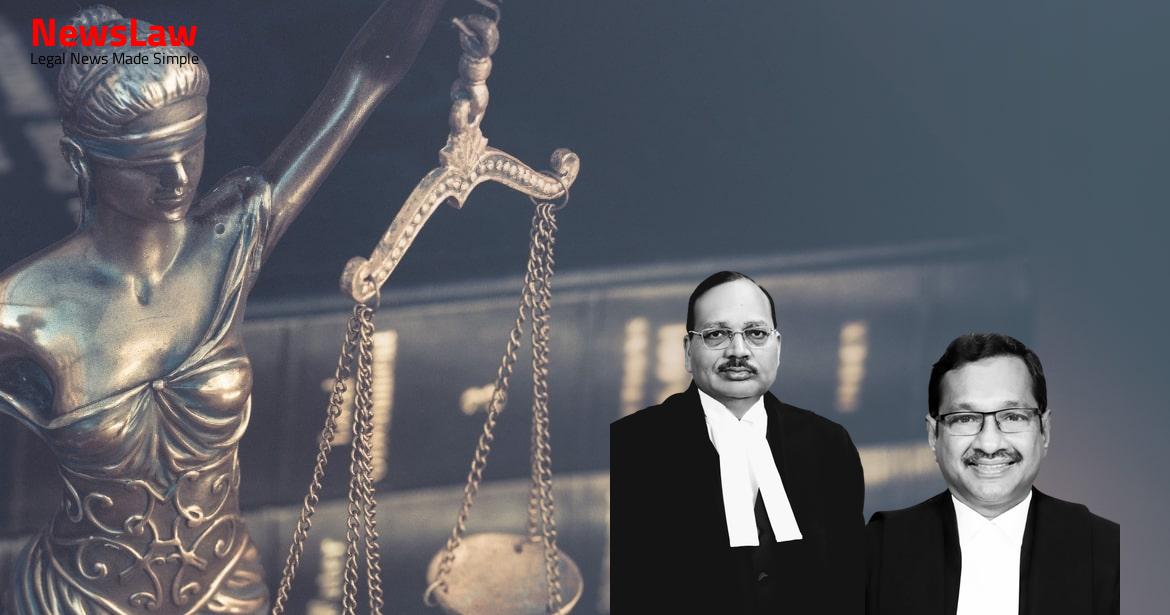Shorn of details, the plaint averments for seeking possession of the suit land, which is a field comprised in Khasra No.20/2, having an extent of 3 Acres and 20 guntas in village Gangalgaon, Taluk Chikhli, District Buldana, are as under: – Original Defendant Nos.1 and 2 viz., The total sale consideration of Rs.10,000/- was given to defendants for the aforesaid entire extent of 3 acres and 20 guntas as the first defendant obtained title over 2 acres and 20 guntas out of the aforesaid total extent from the second defendant as per registered sale deed dated 04.07.1978 and the second defendant remained as the owner in possession of the balance one acre. On the death of the first defendant/the original second respondent during the pendency of the Second Appeal, his legal representatives were impleaded as additional respondents and they are respondent Nos. The first defendant filed a written statement endorsing the claim and contentions of the plaintiff and he would also state therein that after executing the sale deed, himself and the second defendant (the first respondent herein) parted with the possession of the suit land and then, the second defendant (the first respondent herein) turned dishonest and started disturbing the possession of the plaintiff. He would further plead that in the said transactions also, in fact there was no passing of sale consideration from the purchasers as in the case of Exhibit 128 sale deed so as to constitute a valid sale and the other such sale deeds were also executed without any intention to effect sale of the properties, at the time of borrowing money.
that he purchased the suit field from Defendants as alleged? proves that the suit sale deed is bogus, sham and nominal as alleged? On the basis of the findings returned on the issues thus formulated, the trial Court came to the conclusions that the plaintiff had not purchased the suit field as claimed, that he had failed to prove that the execution of the sale deed was for a legal necessity of the second defendant. Thus, it is evident that upon finding that the trial Court had virtually ignored the legal impact and effect of registered sale deed (Exhibit 128), in respect of suit land executed in favour of the appellant therein viz., the plaintiff, the First Appellate Court considered the issues formulated by focusing that aspect. A perusal of the impugned judgment would reveal that the High Court re-framed the substantial questions of law on 15.10.2015 as hereinunder: – [1] Whether the plaintiff has established his entitlement for a decree of possession of the suit property on the basis of the sale deed dated 21.04.1979 at Exh.128 executed by the defendant Nos.1 and 2? [3] While reversing the findings recorded by the trial Court, whether the lower appellate Court has ignored the findings recorded by the trial Court on the material facts in the light of undisputed factual position?” 10. (iii) The second defendant (first respondent herein) has also admitted execution of registered sale deed in favour of defendant No 1 (earlier in point of time than Exhibit 128) in respect of 2 acres and 20 guntas.
In this context, it is apt to note the re-framed substantial question of law No 3 by the High Court, extracted above, that carries the query whether, while reversing the findings recorded by the trial Court, the lower appellate Court had ignored the findings recorded by it on the material facts in the light of undisputed factual position. A scanning of the trial Court judgment would reveal indubitably that despite the admission of the execution and registration of Exhibit 128 sale deed dated 21.04.1979 by the second defendant in favour of the plaintiff and also that of the sale deed dated 04.07.1978 by him to the first defendant, it had failed to consider the legal effect and impact of execution and registration of such a sale deed in view of the provisions under the Transfer of Property Act, 1882, as also the Registration Act, 1908, and sans such consideration accepted the second defendant’s contention that it is a sham document. The trial Court has also held the sale deed virtually invalid by accepting the contention that the transaction violated the provision under Section 8 of the Fragmentation Act and in that regard the sale deed dated 04.07.1978 executed between defendant Nos. … In event, according to provision of Consolidation of Act and Prevention of Fragmentation Act, the plaintiff not entitled to any relief.” In view of the aforementioned facts as also taking note of the contentions raised on behalf of the contesting respondents, in support of the impugned judgment, that the First Appellate Court failed to consider at all the voidness of the sale transaction of 2 acres and 20 guntas between original defendants 1 and 2, its impact on the sale of consequentially created ‘fragmentation’ of one acre by the second defendant and the whole sale transaction effected under Exhibit 128 sale deed by operation of the Fragmentation Act and further that the said aspect was rightly considered by the High Court, we think it only proper to deal with that matter appropriately.
In the said circumstances, to know the meaning of the words ‘transfer of any land’ used in Section 9 (1) of the Fragmentation Act, one may have to see the definition of ‘transfer of property’ under Section 5 of the ‘Transfer of Property Act, 1882, (hereinafter referred to as, the TP Act’), which reads thus:- 5. Act, presupposes transfer from one person to another of the right in property and in other words, in sale, the ownership of the property is transferred. Thus, obviously, it is not the object or purpose of the Fragmentation Act to totally prohibit or prevent transfer of land within any notified ‘local area’, but it is only aimed at preventing the fragmentation of agricultural holdings and to provide for the consolidation of agricultural holdings for the purpose of the better cultivation thereof.
Contextually, it is apposite to state that though in a suit a defendant is entitled to raise alternative inconsistent plea he could not be permitted to raise pleas which are mutually destructive of each other and raising such pleas would only work out to his detriment. (1) If any suit instituted in any Civil Court or Mamlatdar’s Court involves any issues which are required to be settled, decided or dealt with by any authority competent to settle, decide or deal with such issues under this Act (hereinafter referred to as the ‘competent authority’) the Civil Court or Mamlatdar’s Court shall stay the suit and refer such issues to such competent authority for determination. We made this statement because the first proviso to Section 9(3) of the Fragmentation Act would reveal that the automatic voidness would not be attracted to a transfer of land contrary to the provisions of the Fragmentation Act, if it was made on or after 15 day of November, 1965 and before the commencement of Maharashtra Prevention of Fragmentation and Consolidation of Holdings (Amendment) Act, 2017 and that apart, Section 31, referred therein, which puts bar for sale, makes it clear under clause (iii) Sub-section (3) thereof, that the said bar would not apply to any land which is to be transferred to an agriculturist, in its entirety provided such transfer is not creating a fragment.
If that is accepted, then, there is absolutely no question of applicability of the provisions of ‘the Fragmentation Act’ as they would apply only in the eventuality of an actual transfer of land or partition of land subject to the satisfaction of other conditions. Taking note of the fact that the regular civil suit is of the year 1979, at this distance of time and also for the reasons stated hereinabove and to be unfolded hereinafter, we are not inclined to remand the matter to decide the question whether the second defendant/
Also Read: https://newslaw.in/case-type/criminal/suppression-of-material-facts-and-fraud-on-the-court/
the first respondent herein had succeeded in establishing that the subject suit involves any issue required to be settled, decided or dealt with by any competent authority under the said Act and therefore the subject suit was to be stayed as mandated under Section 36B of the Fragmentation Act and such issue was to be referred to such competent authority for determination. This position is unquestionably applicable in the case on hand in view of the specific wordings under Section 36B of the Fragmentation Act viz., if any suit instituted in any Civil Court or Mamlatdar’s Court involves any issues which are required to be settled, decided or dealt with by any authority competent to settle, decide or dealt with under this Act.
We have already referred to the sole, vague averment in the written statement filed by the second defendant in the suit referring to the Fragmentation Act, which in no way could construe as a counter-claim capable of treating as a plaint and governed by the rules applicable to plaints in terms of Order VIII Rule 6 A, CPC and enabling the court to pronounce a final judgment in the same suit, both on the original claim and on the counter-claim. It was further held that the words “any right or claim in respect of a cause of action accruing with the defendant” would show that the cause of action from which the counter claim arises need not necessarily arise from or have any nexus with the cause of action of the plaintiff. Now, it is required to be noted that despite the lack of foundational facts attracting the applicability of the ‘Fragmentation Act’ (in fact, there is no serious consideration of such aspects by the trial Court and the High Court) and the position revealed from the aforesaid decisions and the provisions and on the question of raising of any right or claim by way of counter-claims, we are at a loss to understand as to how the trial Court and the High Court came to frame issues and consider such issue(s), that too, ignoring the statutory bar of jurisdiction to go into and decide, issue No.9 framed by the trial Court, as extracted in paragraph 4 hereinabove and issue
As relates issue No 9, framed by the trial Court, at the risk of repetition, we will state that in regard to ‘the Fragmentation Act’ only a very vague plea was taken in the written statement by the second defendant viz., “In event, according to the provisions of Consolidation of Act and Prevention of Fragmentation Act, the plaintiff is not entitled to any relief.”
Thus, when the indisputable position is that no counter-claim, within the meaning of Order VIII Rule 6A, CPC was made by the second defendant and no averment whatsoever was made specifically in the written statement filed by him how such an issue as to whether ‘he had proved to be a marginal owner’ in the light of the ‘Fragmentation Act’ arise for consideration. So, under the section 8A of the fragmentation Act, the sale deed on Exh-128 in regard to the suit property executed by the Defendant No 2 in respect of 1 acre of land as per Plaintiff’s case is barred by this section. 3,000/-
and he has shown his readiness and willingness to deliver the possession of it to the plaintiff.” Obviously, the First Appellate Court also arrived at the same finding in respect of the said extent of land and this fact has been duly taken care of by the High Court in paragraph 15 of its judgment. Thus, a careful scanning of the impugned judgment would reveal that virtually, the High Court considered the validity of the sale deed dated 04.07.1978 executed by the second defendant in favour of the first defendant under ‘the Fragmentation Act’, without directly framing an issue precisely on the same and then, decided the validity of the sale deed dated 21.04.1979 executed by the second defendant in favour of the plaintiff.
That apart, indisputably, the second defendant did not dispute the execution of the registered sale deed dated 04.07.1978 by him in favour of the first defendant and in his written statement the second defendant had only stated that according to the provisions of the Fragmentation Act the plaintiff was not entitled to any relief. 128 sale deed dated 21.04.1979 executed by the second defendant in favour of the plaintiff, even-after noting the finding of the First Appellate Court that as relates the sale of one acre of land under Ext.128 sale deed the second defendant did not have any grievance and then, observing, in tune with the same, that the second defendant did not dispute that he sold one acre of land to the plaintiff as per Ext.128 sale deed for the consideration of Rs. The long and short of this long discussion is that for all the reasons mentioned above, the decision of the High Court on the validity of the sale transaction covered under the sale deed dated 04.07.1978 executed by the second defendant in favour of the first defendant, in terms of the provisions under the Fragmentation Act (when that question was not legally available to be considered in the subject suit) and the virtual declaration of the said sale as void, are absolutely unsustainable. There can be no doubt with respect to the position that where a deed of sale had been duly executed and registered, its delivery and payment of consideration have been endorsed thereon it would amount to a full transfer of ownership so as to entitle its purchaser to maintain a suit for possession of the property sold. Being a registered one and apparently containing the stipulations of transfer of right, title and interest in favour of the vendee on the land involved therein and described therein and also recital regarding receipt of sale consideration the burden was entirely on the second defendant to establish otherwise and to prove that it did not reflect the true nature of transaction. Before delving further into the matter, it is relevant to note that the First Appellate Court observed and held, after appreciating the evidence on record, that as relates one acre out of the total extent of 3 acres 20 guntas sold by the second defendant comprised in Survey No 20/2 as per Ext.128, the second defendant did not have any grievance. 3000/-, but has denied to have sold 2 acres and 20 guntas of land to the plaintiff.” When that be the indisputable factual position all the other contentions raised by the second respondent against the plaintiff, including money lending, non- passing of sale consideration in respect of the said extent of one acre would all become inconsequential and unsustainable and unnecessary to be gone into. Evidently, the High Court did not frame the validity of the sale deed dated 04.07.1978 executed by the second defendant in favour of the first defendant as a question of law though the trial Court also arrived at a finding on this issue without framing it as a specific issue. Since the validity of the sale deed dated 04.07.1978 was not an issue/question that could be raised by the second defendant against the first defendant in the subject suit and was rightly, not raised as an issue, the first defendant not only did not dispute the sale of such extent to the plaintiff but admitted the joint execution of Ext. An inter-se dispute on the validity of the sale deed dated 04.07.1978, if at all between the second and first defendants, could not have been considered in the subject-suit, for the reasons already mentioned as it would amount to adjudication of right or a claim, by way of counter-claim by one defendant against his co-defendant. 3000/- and admission of execution of sale deed dated 04.07.1978 in favour of the first defendant and in the absence of anything on record establishing annulment of the said sale deed and also in view of the fact that the first defendant is also a co- executant. The upshot of our consideration as above, is that the High Court has committed a serious error based on perverse appreciation of evidence, in setting aside the judgment and decree of the First Appellate Court decreeing the subject suit and in restoring the decree of dismissal of the suit of the trial Court. Consequently, we restore the judgment and decree of the Court of Additional District Judge, Buldana in Regular Civil Appeal No 98 of 1987 arising from the judgment and decree in Regular Civil Suit No 257 of 1985.
Case Title: DAMODHAR (D) THR. LRS. Vs. TEJRAO BAJIRAO MHASKE AND ORS. (2023 INSC 491)
Case Number: C.A. No.-000930-000930 / 2023



